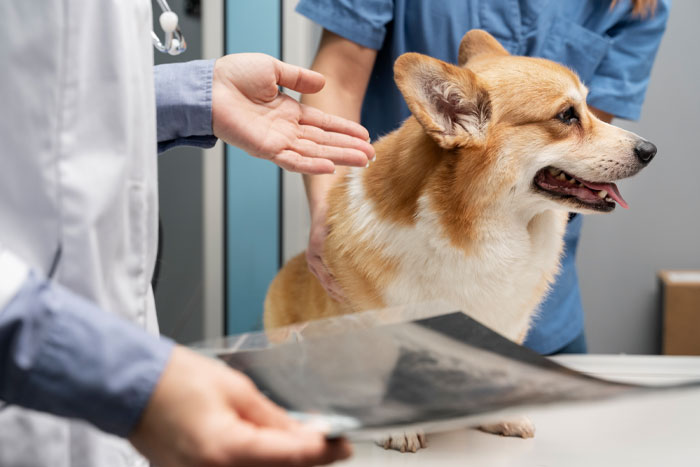As a dog owner, it’s important for you to understand and recognize dog constipation. This common issue involves infrequent or difficult bowel movements and can indicate underlying health problems. This guide breaks down what you need to know about causes, symptoms, and diagnosis.
Remember, proper veterinary care is the key to managing and treating this condition.
- Dog constipation can signal underlying health issues and requires proper veterinary care for management.
- Normal dogs should have 1-3 bowel movements daily. Less frequent, hard, dry stools indicate constipation.
- Diet, age, activity levels, and health conditions like kidney diseases can cause constipation in dogs.
- For mild constipation, increasing water, fiber, and exercise may help. Severe cases require vet intervention.
The information provided herein is for informational purposes only. Please refer to our disclaimer for more details..
- What is Dog Constipation?
- Common Causes of Dog Constipation
- Signs and Symptoms of Dog Constipation
- Diagnosis and Vet Treatment for Dog Constipation
- When To Take a Constipated Dog to the Veterinarian
- Dog Constipation Home Remedies
- What NOT To Do When Your Dog Is Constipated
- How Can You Prevent Constipation in Dogs?
- Conclusion
What is Dog Constipation?
Constipation in dogs is when your pet finds it hard to pass stool. They may have lower bowel movements or exhibit pain and discomfort while trying to do so. If this situation persists, the pet experiences intense pain and terrible health implications.
It is always important to notice when your dog is not pooping as they normally do, which should usually be once or at times twice a day.
Normal Bowel Movements in Dogs
A regular dog would have one to three defecations in a day, just after eating. The stool should be soft but formed. A deviation from the pooping characteristic of a dog means constipation or other health conditions.
Difference Between Occasional Delayed Bowel Movements and Constipation
There are times when it is normal for dogs to delay their bowel movement. But if your dog consistently does it and hasn’t gone for quite a long time, then he might be constipated. Constipation means a problem with less frequent hard and dry stools that are tough for him to pass.
Chronic Constipation, Obstipation, and Megacolon as Severe Conditions
Severe conditions of constipation in dogs may result from chronic constipation.
- Obstipation will imply that your dog is unable to defecate at all.
- Megacolon will be a situation where the colon gets dilated and hence it becomes problematic for the dog to defecate.
These conditions tend to be severe and can dramatically affect the quality of life of your dog. With all this in mind, these should be treated and the opinion of a vet sought over the treatment plan.
This knowledge will enable you to look out for symptoms of constipation in your dog. Early recognition and veterinary attention are key factors in maintaining the health and comfort of your pet friend.
Common Causes of Dog Constipation
A responsible owner of a pet dog would know the different factors that cause constipation in dogs. The different causes of constipation in dogs can be described below.
Dietary Factors
Lack of enough fiber in the dog’s diet can account for constipation. He may also eat unsuitable items like rocks, toys, hair or kitty litter. These things tend to get stuck inside the digestive tract. Apart from the argument that bones and their meals are found to have lots of calcium and suit best as a supplement to make your dog’s poop hard and dry.
Age-Related Factors
The rate of constipation in the body increases with an increase in the dogs’s age. The passage slows down as the dog’s organs, including that of the digestive tract, become less efficient compared to younger people.
Activity Level
In the case of a dog, the digestion process may be slow if the rate of activity is not so much high. Physical activity enables healthy digestive tracts of the dog.
Neurologic Disease
Ailments in the spinal cord and injuries to the nerves can interrupt the normal process of elimination in dogs, thus causing constipation.
Obstructive Disorders
Colon-blocking tumors, injury, or foreign bodies in the alimentary canal would warrant veterinary attention emergently.
Systemic Diseases
Kidney diseases, diabetes, and thyroid disorders (both underactive and overactive) among others can disturb the bowel movements of your dog.
Behavioral Disturbances
Travel stress, loud noises, or changes at home observed make your dog disturbed to do its routine pooping chores.
Orthopedic Conditions
Problems in the joints or hips may not let your dog to assume the proper position of defecation, thus resulting in constipation.
Drugs and Effects
Some medicines that cause constipation in dogs include diuretics, antihistamines, and certain antacids. Always discuss with your vet the side effects of any medicines your dog is on.
Understanding these causes should help you take proactive steps towards preventing the dog suffering from constipation which sure affects its health and comfort.
Signs and Symptoms of Dog Constipation
When it comes to your pet developing constipation, a dog owner should be aware of the signs. We’ll list major signs of constipation for you to react immediately if your dog feels uncomfortable. Signs of constipation include:
Straining to Defecate
One of the most apparently clear indications is if your dog strains excessively trying to defecate and shows signs of discomfort. It isn’t something that should be misread as other problems such as diarrhea or going a lot.
Producing Small, Hard, Dry Stools
If your dog is able to defecate, their bowel movement might be very small, hard, and dry. This stool change is a classic symptom of constipation.
Decreased Appetite and Vomiting
Loss of appetite and vomiting can also occur with constipation. These are symptoms of digestive upset or may be indicative of a serious problem.
Weight Loss and Tense, Painful Abdomen
Over time, weight loss would continue to develop if the constipation is unrelieved. The abdomen will be bloated and palpation will cause tenderness.
Lethargy and Low Energy
A dog that is suffering from constipation can be seen to be depressed or unenergetic, because of the pain and general health effects brought about by constipation.
Misinterpretation of Symptoms
Sometimes, very severely constipated dogs may excrete small liquid stool due to excessive straining. Sometimes, this can be presented as diarrhea. In such cases, the attention of a vet is very imperative for the right diagnosis and treatment.
Diagnosis and Vet Treatment for Dog Constipation
You should seek a veterinary diagnosis if you find your dog straining passing bowel movements. You can start by palpating the abdomen during a physical examination for hard feces. This might also entail an examination of the rectum and colon.
If your vet feels there is more to the problem, tests such as X-rays or bloodwork may be recommended. These help in finding out any obstructions or health issues that might be causing it.
How to Treat Constipation in Dogs: Mild to Severe Cases
Treatment of a dog having constipation will depend on its gravity. Let’s discuss them one by one:
For mild cases, modifications of dog routine can usually solve the problem. This modification may include:
- Increase water intake
- Adding more fiber to its diet
- More exercise
Moderate Cases: In certain instances, more intervention may be required. This can include:
- Enemas
- Fluids and occasionally an IV drip
- In the most critical situations, removing feces under anesthesia or heavy sedation
Specific Causes: If a specific underlying cause is found, such as an enlarged prostate in males, then your veterinarian will treat that directly. For example, they may recommend castration.
Diet Changes: High-fiber dietary changes depending upon the cause. This would include a high-fiber or low-residue diet.
Important Note: Do not administer laxatives, stool softeners, or enemas to your dog without consulting with your vet first. The misuse of such products will only aggravate the matter.
Always speak to your vet before attempting any home remedies. They will give advice that is suitable for your dog’s specific health needs.
When To Take a Constipated Dog to the Veterinarian
Signs and symptoms to consider when deciding whether or not to take your constipated dog to the veterinarian:
Severity and Duration of Constipation: If your dog has not taken relief for about 48-72 hours, it is time to talk with a vet. Chronic or severe constipation verging on obstipation can inflict major damage on the large intestine of your dog.
Physical Symptoms: Watch for vomiting, extreme lethargy or anorexia of longer than a day duration and refusal to drink water. These may be indicative of a more serious underlying problem.
Observation of Distress: If not able to appear comfortable to defecate, for example pacing, straining, panting, looking often and licking the belly, that’s a sign of a distress call and thus a vet visit.
Other Serious Signs: If your dog’s belly gets to be swollen, weakens, there is blood in its stool, these are serious signs for the vet to give immediate attention.
Some at home remedies may be appropriate in mild cases. But when the symptoms don’t improve or become worse, and your dog fails to pass a stool after a day of starting home treatment, seeking veterinary advice is necessary.
Dog Constipation Home Remedies
The following home care measures may be tried in the case of mildly constipated:
Increase Water Intake: Ensure your dog takes in sufficient water since dehydration simply can aggravate constipation.
Boost Fiber Intake: Adding more fiber to your dog’s diet can help. Natural sources like pure canned pumpkin puree (not pie filling) can be useful. However, consult your vet first, as excessive fiber can also cause issues.
Encourage Exercise: Further encourage regular exercise and this physical activity can stimulate bowel movements.
Consider Probiotics: Give your dog probiotics. These may help maintain a healthy gut, encourage digestion.
Use Stool Softeners: Those products containing psyllium, such as Metamucil, act as fiber supplements and make stool softer. But consult your vet for the correct dosage.
What NOT To Do When Your Dog Is Constipated
During treatment at home, you should avoid certain things:
- No Mineral Oil, or OTC Enemas: These could be dangerous if not used correctly. Mineral oil can cause aspiration pneumonia, and many enemas are toxic to dogs.
- Don’t Pull Objects from Your Dog’s Anus: If you find anything that looks like a string, do not try and pull it out. It could cause harm. When in doubt, ask your vet.
- Stay Away From Human Medicine: It can be harmful to dogs without consultation with vets.
- Don’t Ignore Persistent Symptoms: If home remedies don’t work or symptoms surpass 48 hours, get veterinary help.
How Can You Prevent Constipation in Dogs?
Prevention is equally important to your dog’s health and comfort as treatment. Here is how to prevent constipation:
Exercise and Diet: Daily exercises should be carried out. Equally important is a well-balanced fiber-rich diet. Add the necessary dog-friendly fruits and vegetables to enhance nutrition. Mix canned food if your dog eats dry food.
Ensure Proper Hydration: Fresh water should always be freely available at any given time. Proper hydration also prevents the dog from suffering constipation and keep the digestive system in proper functioning.
Monitor What Your Dog Chews To Avoid Blockages: Make sure to keep an eye on what your dog chews so that he cannot ingest anything harmful leading to blockages.
Regular Veterinary Check-Ups for Early Detection: Regular vet and check-ups potentially catches early signs leading to issues of constipation in dogs.
Conclusion
Remember, constipated dogs need prompt attention. Always look out for signs such as straining, hard gaps between each passage of the stool, loss of appetite in your dog, and being lethargic. Should it continue or worsen, visit your vet.
You can minimize incidences of constipation with a balanced diet, enough water, and exercise. Don’t use other home remedies without advice from your vet. Early intervention is key to keeping your dog healthy and comfortable.

 Image credits:
Image credits:  Image credits:
Image credits:  Image credits:
Image credits: 


0
0